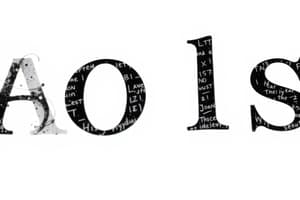Podcast
Questions and Answers
What is a common way to ask someone if they are free for a meeting?
What is a common way to ask someone if they are free for a meeting?
- Do you want to hang out later?
- Are you free to meet? (correct)
- Can we grab lunch tomorrow?
- Are you available this weekend?
Which phrase would you use to ask for clarification during a conversation?
Which phrase would you use to ask for clarification during a conversation?
- Are we on the same page?
- Could you repeat that? (correct)
- What do you think?
- Does that sound good to you?
When confirming that someone understood what you said, which phrase is appropriate?
When confirming that someone understood what you said, which phrase is appropriate?
- Does this make sense? (correct)
- Are we done here?
- Could you elaborate?
- What do you mean?
What is a casual way to ask if someone agrees with your statement?
What is a casual way to ask if someone agrees with your statement?
How could you ask someone to speak more slowly if you are having difficulty understanding?
How could you ask someone to speak more slowly if you are having difficulty understanding?
Which of the following is NOT a way to express that you are in agreement?
Which of the following is NOT a way to express that you are in agreement?
If you want to ask for someone’s availability at a specific time, which phrase would be best?
If you want to ask for someone’s availability at a specific time, which phrase would be best?
What does the expression 'grab' typically refer to in a social context?
What does the expression 'grab' typically refer to in a social context?
What is the primary focus of the lesson discussed?
What is the primary focus of the lesson discussed?
What does 'get rid of' mean in the context of the lesson?
What does 'get rid of' mean in the context of the lesson?
What grammatical structure is used when mentioning 'we've already announced over 500 reforms'?
What grammatical structure is used when mentioning 'we've already announced over 500 reforms'?
In the phrase 'because milk was somehow classified as an oil,' what does 'classified' mean?
In the phrase 'because milk was somehow classified as an oil,' what does 'classified' mean?
What does the term 'a fraction of them' signify in the lesson?
What does the term 'a fraction of them' signify in the lesson?
How is the contraction 'we've' pronounced in the lesson?
How is the contraction 'we've' pronounced in the lesson?
What is the significance of 'over' in the phrase 'over the next 5 years'?
What is the significance of 'over' in the phrase 'over the next 5 years'?
What does it mean when a word is described as having a 'soft D' pronunciation?
What does it mean when a word is described as having a 'soft D' pronunciation?
What type of speech pattern does Barack Obama use in his pronunciation according to the lesson?
What type of speech pattern does Barack Obama use in his pronunciation according to the lesson?
In the context of the lesson, what does 'infinitive' refer to?
In the context of the lesson, what does 'infinitive' refer to?
What is meant by 'unstressed pronunciation' in natural spoken English?
What is meant by 'unstressed pronunciation' in natural spoken English?
Which of the following sentences contains a grammatical mistake as indicated in the lesson?
Which of the following sentences contains a grammatical mistake as indicated in the lesson?
What does the term 'faster English' refer to in the context of the lesson?
What does the term 'faster English' refer to in the context of the lesson?
What is indicated by the phrase 'just a fraction' in the lesson?
What is indicated by the phrase 'just a fraction' in the lesson?
Flashcards are hidden until you start studying
Study Notes
Informal English Phrases
- Native speakers use the verb "grab" as a casual way to suggest meeting up for a meal or drink
- Adding "tonight" or a time reference makes the invitation more specific
- "Are you free to meet?" is used for formal arrangements and could include a specific time
Clarifying Language
- "Sorry, I didn't catch that" is used to ask for a repeat
- "Sorry, what does X mean?" can be used to ask for clarification on a specific word
- When struggling to understand someone, be honest and ask them to speak up or slow down
Confirming Understanding
- "Do you know what I mean?" is a good phrase to use after explaining something
- "Does that make sense?" is another way to confirm understanding and can be shortened to "make sense" with rising intonation
- "Does that sound good to you?" is used to get agreement and can be shortened to "sound good" with rising intonation
- "To be on the same page" is used to confirm a shared understanding or agreement
Common Pronunciation Differences
- Native speakers often use contractions like "I've" for "I have"
- The word "to" is commonly unstressed to a "t" sound in natural speech
- Final voiced sounds, like "t" in "don't" and "c" in "make" are often dropped for a smoother pronunciation
- The word "them" can be pronounced with a strong "m" or a weak, unstressed "m" sound
- Native speakers use connected speech, transforming individual words into a single word (like "got rid")
Understanding Pronunciation
- Phrases like "Could have" can be unstressed to "Coulda" in spoken English
- These changes in pronunciation are specific to spoken English and shouldn't be used in written English.
- The phrase "get rid of" is a synonym for "eliminate".
Studying That Suits You
Use AI to generate personalized quizzes and flashcards to suit your learning preferences.




